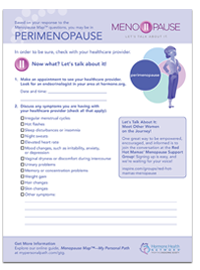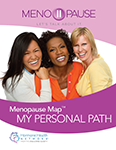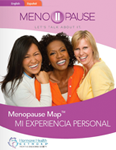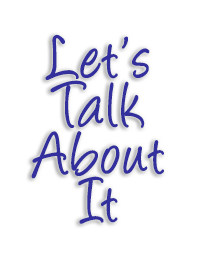

Based on your response to the questions, you may have what is known as perimenopause.
Symptoms typically begin 3 to 5 years before the onset of menopause, starting when a woman is in her 40s, — but this is not always the case.
You can learn more about Perimenopause and all stages of menopause by reading our guide.
1. Read our guide, Menopause Map™—My Personal Path.
2. View your Quick Guide to Symptoms and Treatments
Also, don't forget to visit the Red Hot Mamas and hormone.org websites for more educational materials on menopause.
Sign Up for free e-newsletter!
If you would like to receive a monthly e-newsletter, please fill out form below:
Perimenopause

No matter how you experience symptoms or which ones you experience, there are very effective ways for treating them.
Keep in mind that not every woman can benefit from the same treatments. Because you are unique, the way you experience menopause is unique, and the ways you will treat symptoms may not be the same as someone else's.
Print this sheet and take it with you to your health care provider
We'll go through these in detail. Follow the links below to read more about treatments and symptoms:
Symptoms
Irregular Menstrual Cycles
Missing periods is normal for women going through menopause. But some women experience other problems with their period, including excessive bleeding or periods that come close together. There are ways to treat these problems:
- Estrogen: Hormone therapy can treat many menopause symptoms, including menstrual problems. However, there are risks to consider. See section on Estrogen and Hormone Therapy
- Low-dose birth control pills: When problems with menstrual cycles persist, birth control pills can help regulate periods. You can learn more about this treatment here
You can learn more about menopause treatments by visiting our site's educational materials on menopause. If you'd like to learn even more about menopause, read our guide, Menopause Map™—My Personal Path, and visit the Red Hot Mamas website.
Hot Flashes
There are three common treatment options for hot flashes:
- Estrogen: Hormone therapy can treat many menopause symptoms, including hot flashes. However, there are risks to consider. See section on Estrogen and Hormone Therapy
- Gabapentin: This medication works well at relieving hot flashes, especially those that occur during nighttime. The downside: It can make you dizzy and lethargic when used during daytime.
- SSRI drugs: Selective serotonin reuptake inhibitors (SSRIs) are primarily used as antidepressants, but they have proved to be effective in treating hot flashes, as well. You can learn more about SSRI drugs here.
But there are other options for managing hot flashes, as well:
- Herbal supplements: Many women have reported success in managing sleep issues with specific herbal supplements and preparations. You can learn more about herbal supplements here.
- Slow, deep breaths: When hot flashes begin, try taking a few slow, deep breaths. This technique helps some women reduce the effects of hot flashes.
Sleep Disturbances or Insomnia
Problems with getting a good night's sleep are among the symptoms of menopause that can interfere with a woman's life. Fortunately there are effective ways of handling these problems, including:
- Change your bedtime habits. These changes can include wearing loose-fitting cotton bedclothes and keeping your bedroom cool and well-ventilated at night. Also, try to go to bed at the same time every night, and limit or avoid naps during the day.
- Exercise regularly: Exercise helps encourage good sleep patterns. But avoid exercising too close to bedtime.
- Limit spicy food and caffeine. This is especially important in the hours before bedtime.
- Estrogen: Hormone therapy can treat many menopause symptoms, including sleep problems. However, there are risks to consider. See section on Estrogen and Hormone Therapy
- Prescription medications: There are more prescription sleep aids available now, but these can have side effects. If nothing else is helping you get the sleep you need, talk with your doctor about what prescription medication options might make sense for you.
- Herbal supplements: Many women have reported success in managing sleep issues with specific herbal supplements and preparations. You can learn more about herbal supplements here.
Night Sweats
This symptom is closely related to other problems with sleeping and hot flashes that can occur during menopause. It is a very common symptom among women with menopause. As with other sleep problems, night sweats can be treated.
- Change your bedtime habits. These changes can include wearing loose-fitting cotton bedclothes and keeping your bedroom cool and well-ventilated at night. Also, try to go to bed at the same time every night, and limit or avoid naps during the day.
- Exercise regularly: Exercise helps encourage good sleep patterns. But avoid exercising too close to bedtime.
- Limit spicy food and caffeine. This is especially important in the hours before bedtime.
- Estrogen: Hormone therapy can treat many menopause symptoms, including sleep problems. However, there are risks to consider. See section on Estrogen and Hormone Therapy
- Herbal supplements: Many women have reported success in managing sleep issues with specific herbal supplements and preparations. You can learn more about herbal supplements here.
Elevated Heart Rate
Some women report getting irregular heartbeats or heart palpitations (a temporary increase in the heart rate) during menopause. The reason for this is the declining amount of estrogen in your body, which can over-stimulate the nervous system and blood circulation.
Hot flashes can play a role in the heart rate, too. A hot flash can increase heart rate by as much as 8 to 16 beats per minute.
Any change in the heart can be a sign of something seriously wrong, such as a heart condition, so it's wise to report any of these symptoms to your doctor.
Here are some ways to manage irregular heartbeats and palpitations:
- Reduce stress and anxiety. Both stress and anxiety can ramp up your heart rate. Some stress in life is unavoidable, but too much can cause health problems. You can learn more about how to reduce stress and anxiety here.
- Limit salt in your diet. Sodium (salt) stimulates the heart and can raise blood pressure, so you want to limit the amount you get in your diet.
- Limit caffeine and nicotine. If you drink coffee, tea, soft drinks, or other beverages that contain caffeine, keep them to a minimum, and don't drink them close to bedtime. Watch out for foods that contain caffeine, as well. If you smoke, limit it to as few as possible, because nicotine is also a stimulant. Of course, it's best to quit if you do smoke—talk with your doctor about ways to help you quit, and use the QuitLine for help: 1-800-QUIT-NOW (784-8669).
Mood Changes, Including Depression, Irritability, and Anxiety
The options for treating mood problems, including anxiety and depression, are much more numerous than they were in the past. These include:
- SSRI drugs: Selective serotonin reuptake inhibitors (SSRIs) are primarily used as antidepressants, but they have proved to be effective in treating hot flashes, as well. You can learn more about SSRI drugs here.
- Counseling: Talking with a professional therapist can be a very effective way of countering symptoms of mood disorders. You can learn more about counseling here.
- Estrogen: Hormone therapy can treat many menopause symptoms, including night mood problems. However, there are risks to consider. See section on Estrogen and Hormone Therapy.
- Exercise: Physical activity can actually improve your mood and reduce the stress that can trigger anxiety. You can learn more about the benefits of exercise here.
Vaginal Dryness and Painful Sexual Intercourse
To treat these symptoms, the following options are available:
- Vaginal moisturizers: These are over-the-counter, non-hormonal solutions that are applied topically. They do not thicken the vaginal lining, and they are not as effective as estrogens. Some women don't like the consistency or scent of these products.
- Water-soluble lubricants: These are also over-the-counter products, but like vaginal moisturizers, they don't thicken the vaginal lining, and some women dislike their consistency or scent.
- Low-dose vaginal estrogen: Available as tablets, rings, or creams, vaginal estrogens have fewer risks than "systemic" estrogen. Vaginal estrogen helps keep vaginal and urethral tissue from thinning. A small amount of vaginal estrogen gets absorbed into the body, but this should only concern women with a history of breast cancer.
- Estrogen: Hormone therapy can treat many menopause symptoms, including vaginal dryness. However, there are risks to consider. See section on Estrogen and Hormone Therapy
- Ospemifine: This new medication is taken orally and reduces vaginal pain associated with intercourse. However, it may be linked to an increased risk of hot flashes, blood clots, stroke, and the growth of the lining of the uterus.
Urinary Problems
Problems with the urinary tract can affect women in any stage of menopause. As hormone levels decrease, their ability to keep the bladder and urethra healthy also decline.
These problems can include stress incontinence, in which there is leakage from pressure on the weakened bladder, or urge incontinence, in which the bladder muscles "squeeze" at the wrong times.
But there are good treatments for this symptom, including:
- Physical exercises: These can include Kegel exercises, which strengthen the pelvic muscles, as well as learning to hold urine longer and urinating at prescribed times. To learn more about the benefits of exercise see section on Exercise under 'For Women 55 and older'.
- Limiting caffeine: Beverages and foods that contain caffeine can contribute to urinary problems.
- Estrogen: Hormone therapy can treat many menopause symptoms, including urinary problems. However, there are risks to consider. See section on Estrogen and Hormone Therapy.
- Over-the-counter medications: Such OTC medicine as Detrol, Vesicare, Toviaz, Ditropan, Myrbetriq, or Oxytrol have helped women with urinary issues.
Memory and Concentration Problems
Issues with memory loss and problems concentrating occur in some women, particularly in perimenopause. The exact cause of these "mental" problems is unknown. There are helpful treatments available, however:
- Estrogen: Hormone therapy can treat many menopause symptoms, including memory and concentration problems. However, there are risks to consider. See section on Estrogen and Hormone Therapy.
- Vitamins and minerals: These over-the-counter supplements have helped some women with memory and concentration symptoms. These include vitamins B-1, B-3, and B-12, as well as iron. As with any supplement, talk with your doctor before you take any of these, as there can be interactions with other medications you're taking.
- Herbal supplements: Many women have reported success in managing memory and concentration problems with specific herbal supplements and preparations. You can learn more about herbal supplements here.
- Staying mentally active. Doing things to challenge your brain is a great, healthy way to improve memory and concentration. You can learn more about staying mentally active here.
Weight Gain
Gaining weight is a problem for all people as they age. There are a variety of factors affecting how our weight changes as we get older. You can learn more about managing your weight here.
Hair Changes
Many women experience changes to their hair as they reach midlife. The most common of these changes is hair loss. The body's decline in estrogen levels is at least partly to blame for this.
There are many ways to counter the loss of hair. These can include:
- Estrogen: Hormone therapy can treat many menopause symptoms, including issues with hair. However, there are risks to consider. See section on Estrogen and Hormone Therapy below.
- Healthy diet: What you eat (or don't eat) can affect the health of your hair. Make sure you're getting enough iron, protein, vitamin C, and vitamin B in your diet. If you're not, talk with your doctor before considering vitamin supplements, as these can interact with medications you're taking. To learn more about eating healthy see 'Healthy Diet and Lifestyle' section below.
- Herbal supplements: Many women have reported success in managing hair issues with specific herbal supplements and preparations. You can learn more about herbal supplements here.
- Medications: You can learn more about medications for hair loss here.
Another possible issue is unwanted hair growth. Generally, growth on the face (especially around the mouth) is the most bothersome to women. But there are ways to control this. You can learn more about these techniques and treatments here.
Skin Changes
Another common symptom of menopause is changes in the skin. Dry or itchy skin is common, and some women report skin bumps or rashes as well. The decrease in estrogen production that comes with menopause plays a role in this. Estrogen stimulates the production of skin oils and skin collagen, while also affecting the body's ability to retain moisture. A decline in estrogen production reduces these benefits to the skin.
Other factors can also contribute to discomfort of the skin, including the thinning of skin tissues that occurs with age. Fortunately, dry skin is relatively easy to treat in most cases. You can learn more about these treatments here.
Menopause symptoms are treated primarily through medications, over-the-counter dietary supplements, and changes to diet and lifestyle.
Healthy Diet and Lifestyle
Regardless of what symptoms you're experiencing or how intense they are, aiming for a healthy lifestyle is a very positive step you can take toward controlling symptoms and managing menopause.
Here are some steps you can take to help yourself as you move through menopause:
Eat a healthy diet.
Of course, this is a really good idea whether you're going through menopause or not. But good nutrition can help with menopause symptoms. In general:
- Eat 1,200 mg of calcium daily.
- Reduce your daily salt (sodium) intake to 1,500 mg or less.
- Choose low-fat options for meals.
- Maintain the right balance of calories to support an active lifestyle.
- You can figure out how much vitamin D and calcium you're getting as part of your diet by using the helpful calculator here.
Be active.
Physical activity is great for you, both physically and mentally. Try to exercise 30 minutes per day at least 5 days per week. You can figure out how many calories you're burning through exercise by using the calculator here. Be sure to talk with your doctor before beginning an exercise plan.
Maintain a healthy weight. This is especially important as you go through menopause, in particular as you enter postmenopause, when your risk of heart disease increases. If you need to lose weight, talk with your doctor about what approach makes the most sense for you. In general, gradual weight loss works best for keeping the pounds off.
Quit smoking.
At least, try to cut down. Smoking is a known risk factor for serious health problems, including heart disease, cancer, and more. If you need help quitting, talk with your doctor, or call the QuitLine at 1-800-QUIT-NOW (784-8669)
Drink alcohol in moderation.
If you drink, do so carefully. Keep your alcohol consumption to one drink per day (a drink being equal to one 12 oz can or bottle of beer, or a 4 oz glass of wine, or 1 oz of liquor). If you don't drink, don't start.
Manage your stress.
Stress is an unavoidable part of life, but it can be kept under control. There are many effective ways to do this: a hobby, a warm bath, relaxation exercises, deep breathing exercises, yoga, meditation, tai chi—these are just a few ways to keep stress at bay. Exercise is also a great stress reducer.
Get your biannual mammogram.
Women in general have a 1 in 8 chance of getting breast cancer during their lifetime. Fortunately, diagnosis and treatment of breast cancer have improved dramatically even in recent years. A biannual mammogram is one of the main reasons why. Mammograms are very effective at catching breast cancer in its early stages, when treatments are most effective. Because of the potential risk for breast cancer in women taking some types of hormone therapy, a biannual mammogram is that much more important.
More About Estrogen and Hormone Therapy
No doubt you have heard or read something—maybe a lot—about the risks of estrogen and hormone therapy. It's true that you need to weigh the risks and benefits of this type of therapy before beginning it. It's always a good idea to talk with your doctor about any questions or concerns you have.
Important things to think about:
- Estrogen and hormone therapy are very effective in treating symptoms of menopause. Estrogen reduces or relieves hot flashes, vaginal dryness, bone loss, and sometimes even skin changes in many women going through menopause.
- There are indeed risks associated with using estrogen and hormone therapy. When taken alone, estrogen increases the risk of uterine cancer. To help lower this risk in women who still have their uterus, estrogen is combined with progesterone to help protect the uterus. If you've already had uterine cancer, talk with your doctor about whether estrogen therapy would be safe for you.
- If you're a breast cancer survivor, you should avoid taking "systemic" estrogen (the type of estrogen that affects the entire body), as this increases the risk of getting breast cancer again. One option may be to use vaginal estrogen therapy. Talk with your doctor about whether this option makes sense for you.
-
You should also avoid estrogen therapy if you have had:
- Liver disease
- A history of blood clots
- Heart disease
- Stroke
- Any unusual vaginal bleeding that has not been evaluated.
- Current medical guidelines recommend that if you are using hormone therapy, take the lowest dose possible for the shortest time possible, and follow up with your doctor regularly. In general, taking hormone therapy for 3 to 5 years carries very low risks for breast or uterine cancer, provided you meet the criteria mentioned above.
- The risks of using hormone therapy after menopause are generally considered to outweigh the benefits, so this approach is not recommended for postmenopausal women.
There are options to hormone therapy that may help some women. These are worth considering and asking your doctor about:
Bioidentical hormones:
"Bioidentical" means that these hormones are the just like those that your body naturally creates. They're made in a laboratory, but they're often called "natural" hormones because they come from plant sources. Bioidentical hormones come in two types: pharmaceutical products and custom-made products. Pharmaceutical bioidentical hormones are manufactured according to FDA standards and have been tested for safety and effectiveness. Doctors often prescribe these first because they have been thoroughly researched and are "known quantities." Custom-made bioidentical hormones are made in compounding pharmacies, according to a doctor's instructions. But these are not regulated by the FDA, and they can have varying amounts of hormones in their mixtures. Ask your doctor if a bioidentical hormone may make sense for your treatment plan.
Herbal and dietary supplements:
There are many herbal preparations and other supplements that some women have used to treat menopausal symptoms. Many women have found relief from menopausal from these over-the-counter products. These include black cohosh, red clover, evening primrose, vitamin B, soy products, dong quai, and many others. (You can learn more about these here.) But research has not shown a clear benefit to taking any herbal or dietary supplement in treating menopausal symptoms. Keep in mind that, as with any prescription medication, there can be side effects and interactions with other medicines you're taking. Also, the FDA has not approved these products for the treatment of menopausal symptoms and does not regulate them. As with all herbal and dietary supplements, the potency of the listed ingredients can vary. Be sure to talk with your doctor if you are considering taking a supplement to treat your symptoms.
Let's Talk About It
Meet Other Women on the Journey!
One great way to share your story along the menopause journey – to be empowered, encouraged, and informed – is to join the conversation at the Red Hot Mamas' Menopause Support Group! Signing up is easy, and we're waiting for your voice!
Keep the Conversation Going: the Menopause Map™ e-newsletter!
Exploring the Menopause Map™ is really just the beginning of your journey. There's much more to learn! Sign up for our Menopause Map™ e-newsletter!
This informative monthly e-publication will take you through the latest in treatments for menopause symptoms, give you access to news from the research front, connect you with other women who are going through their own journeys with menopause, and much more!
You can sign up for the Menopause Map™ e-newsletter here.
Have a Conversation with Your Doctor
Everything you're reading here is meant to help you understand your menopause journey. The best place to get the information and guidance you need to manage your own journey is to talk with your doctor. We've got a list of questions you can ask on your next visit, available in our guide, Menopause Map™—My Personal Path.
What is an Endocrinologist?
An endocrinologist is a doctor who has received specialized training in the diseases of the glands. They treat diseases that often affect more than just the glands, however. They are specialists in the treatment of such conditions as menopause, metabolic disorders, and diabetes. Find one in your area at the Hormone Health Network's website.
You can learn more about perimenopause by visiting our site's educational materials on menopause. If you'd like to learn even more about menopause, read our guide, Menopause Map™—My Personal Path, and visit the Red Hot Mamas website.
Close panel




